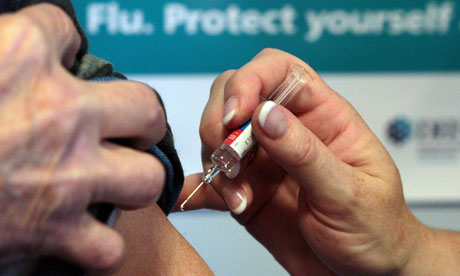
The number of people critically ill with flu in hospitals in England has risen by 60% in a week, putting pressure on intensive care and high dependency units and forcing the delay of some non-urgent operations.
The Department of Health said today that 738 people with confirmed or suspected flu were in "critical care" beds, a substantial rise on last week's figure of 460. They include 42 children under five.
The figures mean about one in five critical care beds are now occupied by flu patients. Bob Winter, president of the Intensive Care Society, called the figures "a concern" but not so bad that contingency plans to increase capacity had to be put into full effect.
The figures come the day after it was revealed that 39 people in the UK have now died from flu this year, a rise of 12 in the last week, with vaccine advisers saying 16m people are at serious risk from flu because of the poor uptake of the vaccine.
A national public health campaign on measures to stop people spreading flu – "catch it, bin it, kill it" – will be relaunched tomorrow. The public will be warned to cover their mouths when sneezing or coughing, put tissues in a bin and wash their hands properly.
The health secretary, Andrew Lansley, has denied Labour claims this was a U-turn, saying he had only vetoed a vaccination advertising campaign. He has argued that advice on this issue is better delivered by GPs.
The Joint Committee on Vaccination and Immunisation (JCVI), which advises the government, says the jab should be taken by those in at-risk groups – those suffering from conditions such as chronic respiratory, heart, kidney or liver disease, the over 65s, pregnant women and the carers of older people – but the committee remains against inoculating healthy children against flu.
The committee's chairman, Professor Andrew Hall, said: "JCVI noted that a large proportion of those individuals with severe disease are in recognised risk groups for influenza but unfortunately were not vaccinated. It strongly reiterated its previous advice that all individuals in risk groups should be vaccinated as soon as possible, particularly those aged less than 65 years."
Hall said: "The committee considered the issue of offering vaccination to healthy children either 0-four years and/or five-15 years of age. However, although there is a high incidence of influenza-like illness currently in these age groups, a significant proportion of this is due to other viruses such as respiratory syncytial virus.
"In addition, only a very small proportion of those with severe disease are in these age groups. Based on previous seasonal influenza epidemiology, it would be hoped that influenza circulation will have subsided within a month. We do not believe that seasonal or pandemic vaccine should be used for these or other healthy person groups.
"The greatest gain will be achieved in increasing vaccine uptake in the clinical risk groups."
Of the 39 deaths, 36 had swine flu and three had another strain, flu type B. Only two are known to have been vaccinated and all but one were under 65. Four were under five, underlining's H1N1 dominance of this flu season since it mainly affects other groups than the elderly. Significantly, 23 of those who have died were in at -risk groups.
NHS pressure group Health Emergency today claimed a number of hospitals in East Anglia were on black and red alert, saying the NHS was already struggling as a result of the flu outbreak.
Chairman Geoff Martin said the James Paget University hospital in Great Yarmouth, Norfolk, yesterday declared a black alert – the most severe status level – and that the Norfolk and Norwich University Hospital was on red alert – one step lower.
He said: "We warned that hospitals would be forced on to black alert as the flu cases fill the available beds. Now it's happening and we do not believe that the chaos is restricted to East Anglia. The NHS is now on the brink of the worst winter crisis in over a decade as the harsh reality of cuts to beds and staffing numbers is exposed with lethal consequences."
A spokeswoman for the hospital said: "The hospital continues on black alert, with the situation being reviewed regularly during the day.
"Activity remains very high, with an increase in attendances and admissions to the hospital. Elective surgery has been affected.
"We would urge anyone who needs medical treatment for minor injuries and illness not to automatically go to A&E but consider all the other options."
However, a spokeswoman for the Norfolk and Norwich hospital said: "We are coping. It is not something out of the ordinary. We are not cancelling anything and we are still doing surgery."
There have been reports elsewhere that some non-emergency cardiac surgery has been delayed to leave critical care beds free for patients with flu.
The latest flu report from the Health Protection Agency says immunisation figures, from mid-December, suggest nearly seven in 10 people over 65 have been immunised across the UK. But the figure for under-65s in at-risk groups was far lower – just over four in 10. England is suffering worse from flu than other parts of Britain, but even there the number of cases is said to be within the normal range of a winter flu season. The incidence in England the week before Christmas suggests 124 people per 100,000 population were judged to have flu-like symptoms after consultations with their GP. This was five times higher than the same week last year and just under twice what it was in 2008. Epidemic levels are not reached until the rate reaches 200 per 100,000 population.

No hay comentarios:
Publicar un comentario